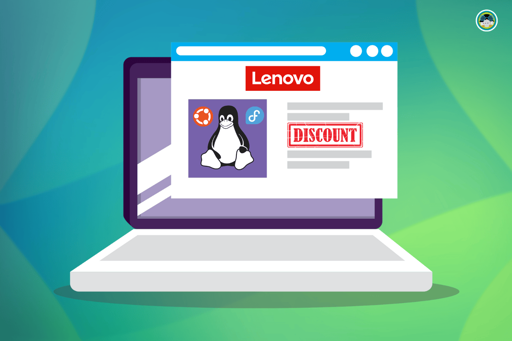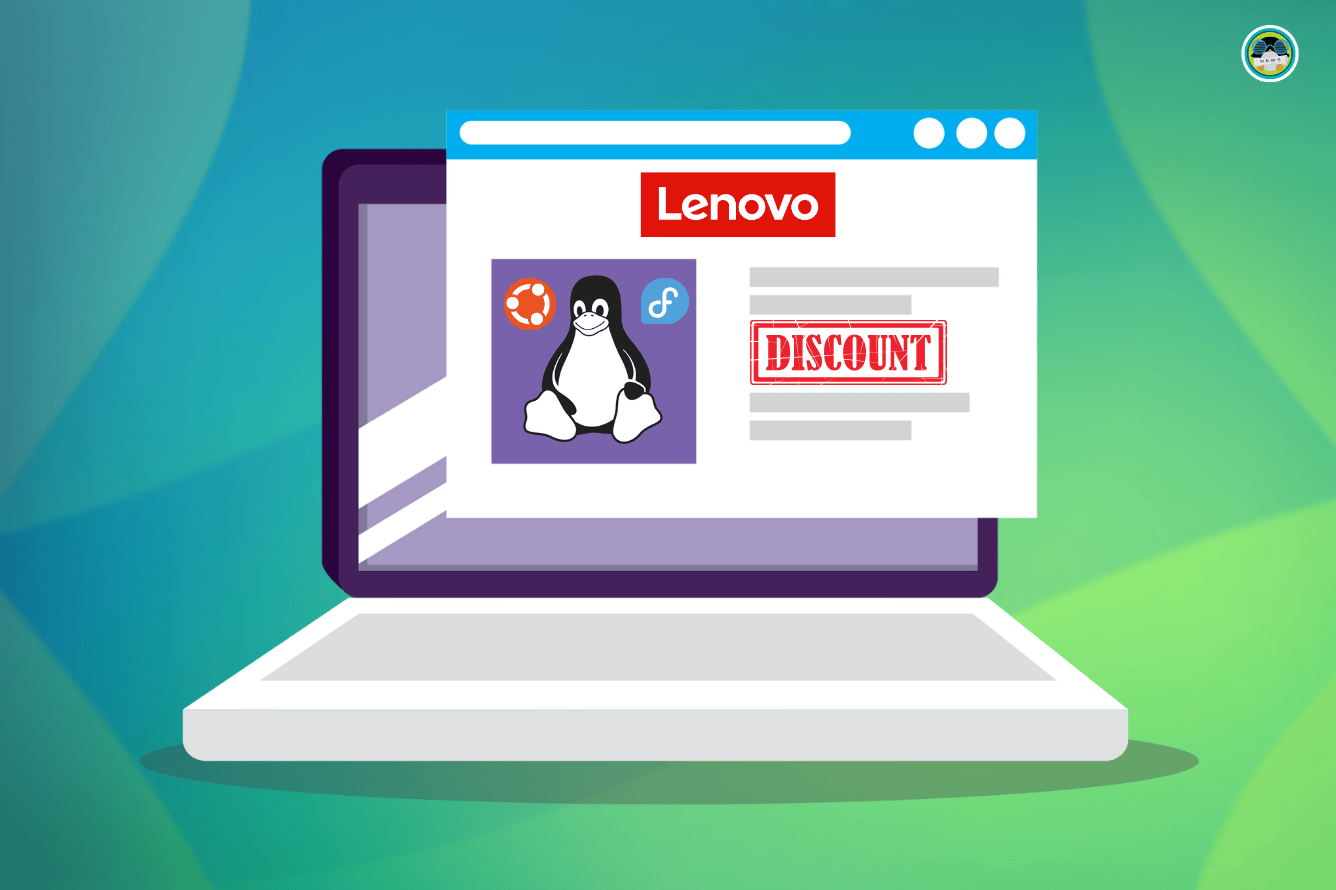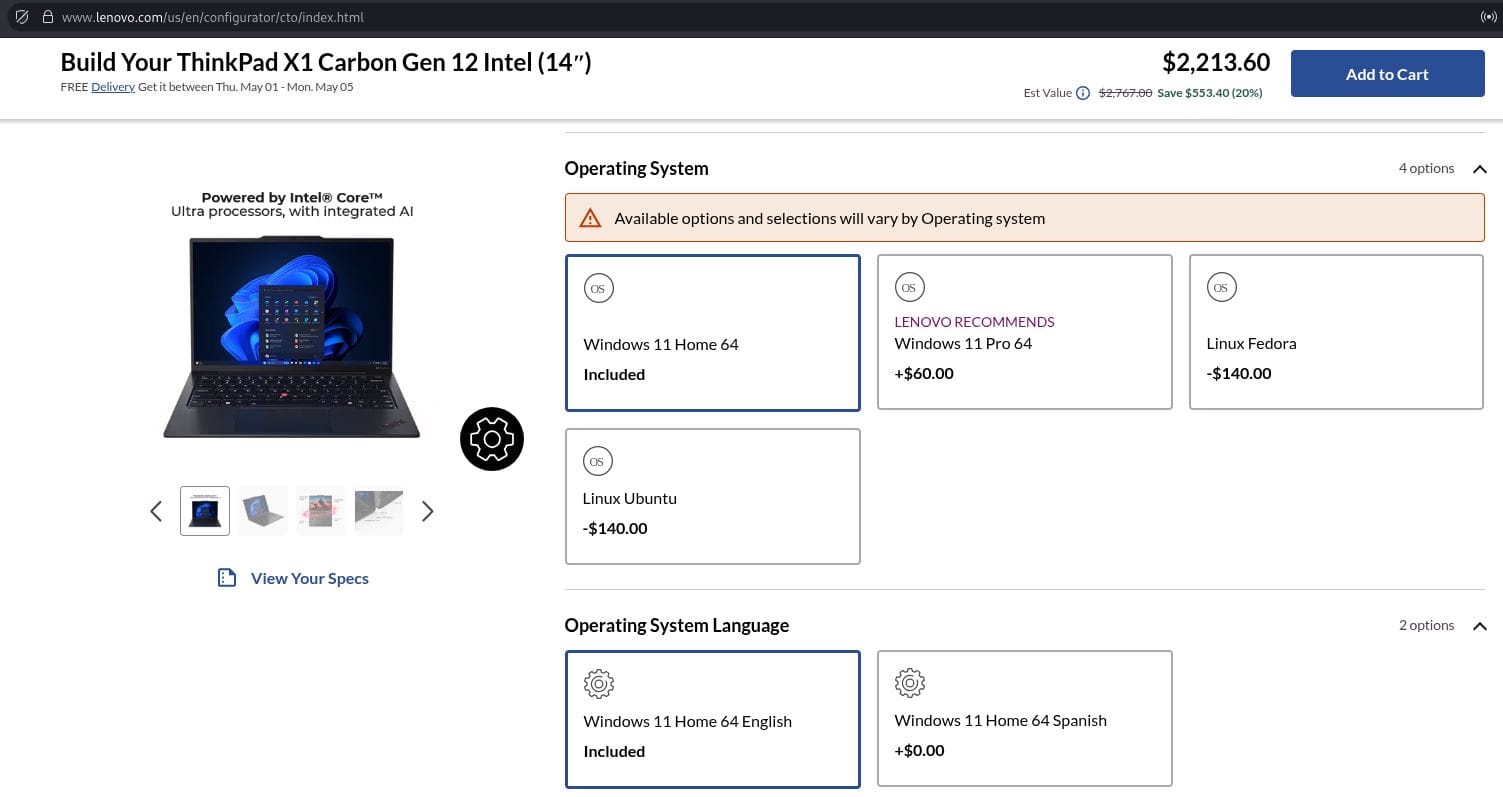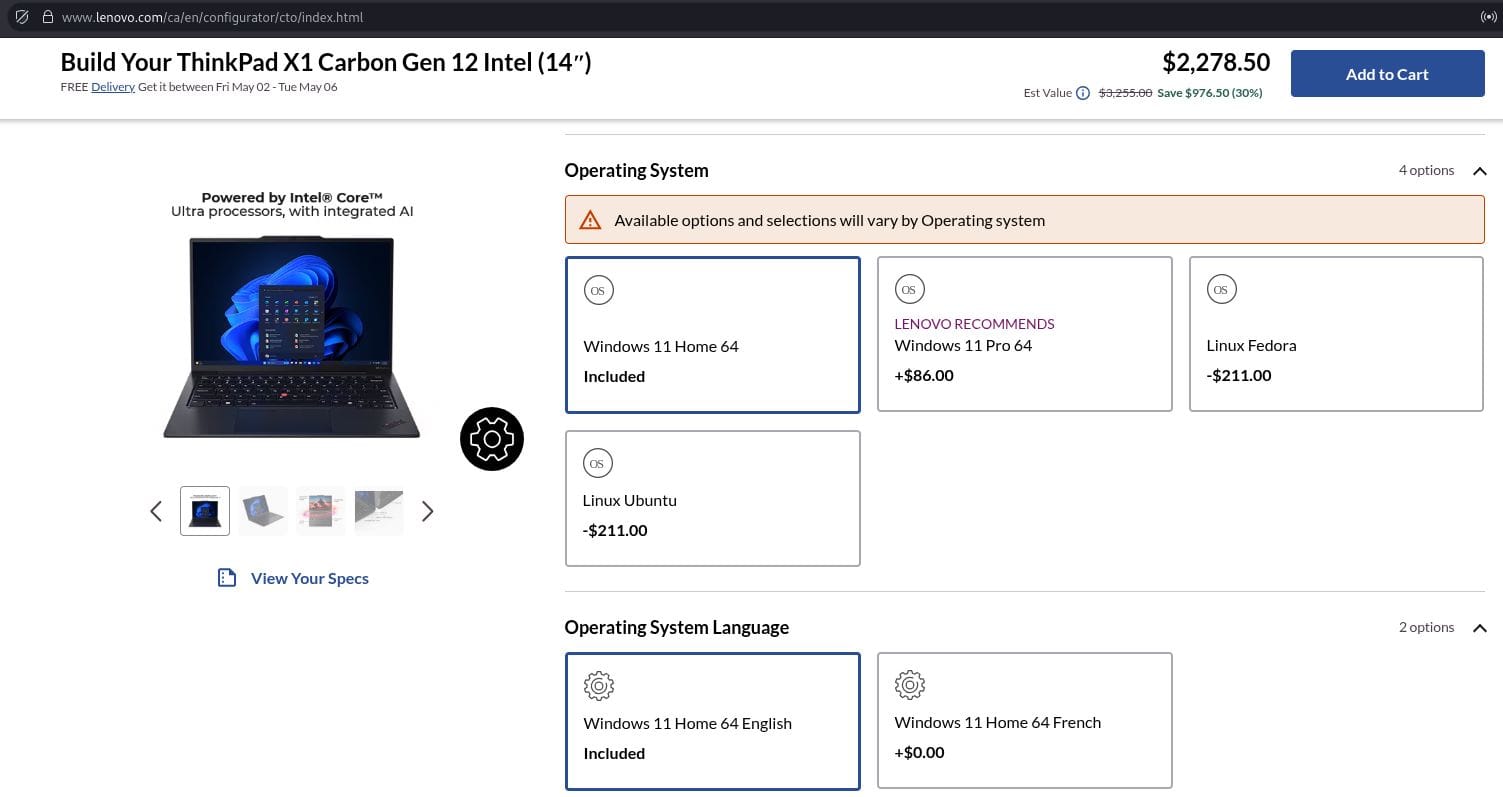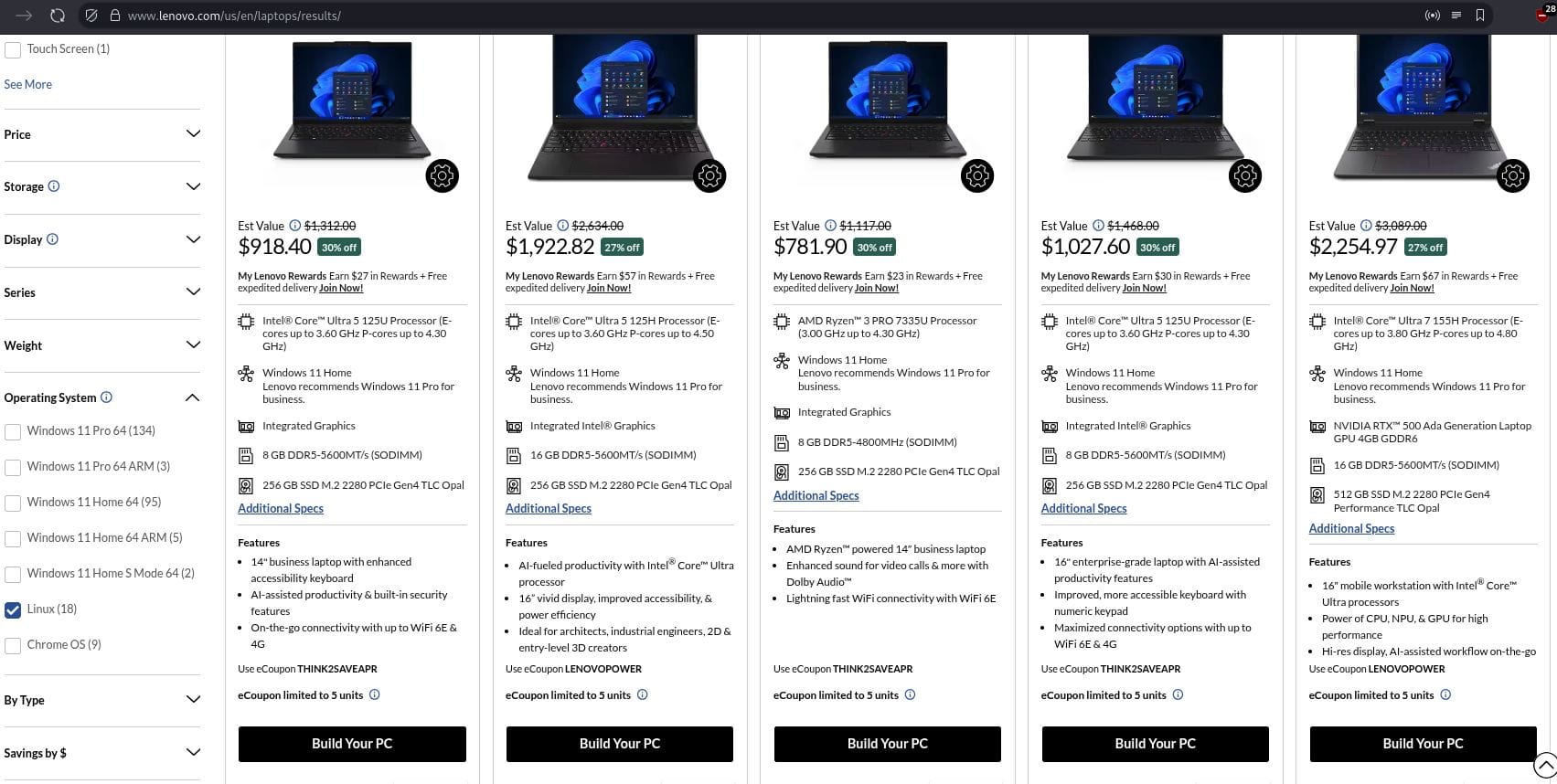cross-posted from: https://rss.ponder.cat/post/165736
At least in the U.S. and Canada, that is.
This was brought to my attention thanks to a Reddit post where a user (presumably a resident of Canada), had posted how Lenovo was shipping laptops with Fedora and Ubuntu at a cheaper price compared to their Windows-equipped counterparts.
Others then chimed in, saying that Lenovo has been doing this since at least 2020 and that the big price difference shows how ridiculous Windows’ pricing is.
Cutting the Windows Tax
When I dug in further, I found out that the US and Canadian websites for Lenovo offered U.S. $140 and CAD $211 off on the same ThinkPad X1 Carbon model when choosing any one of the Linux-based alternatives.
US pricing on left, Canadian pricing on right.
Interestingly, while the difference in pricing is noticeable, your mileage may vary if you are looking for such laptops on the official website. Not all models from their laptop lineup, like ThinkPad, Yoga, Legion, LOQ, etc., feature an option to get Linux pre-installed during the checkout process.
Luckily, there is an easy way to filter through the numerous laptops. Just go to the laptops section (U.S.) on the Lenovo website and turn on the “Operating System” filter under the Filter by specs sidebar menu.
Yes, it’s as simple as that. You can do the same for the various official online regional storefronts that Lenovo runs to see whether Linux-based operating systems are being offered on their laptops in your country.
Closing Thoughts
It is good to see that Lenovo is offering Linux in its laptops. In fact, there is another big-name laptop manufacturer, Dell, who also does something similar with its Ubuntu-certified laptops, but both have the same constraint of having limited options for buyers.
Also, as far as I know, Dell doesn’t reduce the pricing if you choose Linux instead of Windows. Correct me if I am wrong in the comments.
Nonetheless, I think these manufacturers could do a better job in marketing these Linux-based alternative operating systems to general consumers, showing them how they can save big when opting for these instead of the pricey and bloated Windows.
Otherwise, we might have to start observing Windows Refund Day again.
💬 Your take on this? Would mainstream users benefit from having Linux pre-installed on their laptops?
From It’s FOSS News via this RSS feed
This is awesome and I love it. Maybe they could even take a few more dollars off by not having any OS installed (bypassing the labor costs of imaging an SSD). I’ll be installing my own copy anyway, so I’m fine with a blank SSD.
Those manufacturers where you can select either Linux or no OS don’t charge extra for Linux.
I mean it’s like maybe a dollar or two for the labor costs, so that’s understandable. I’d still prefer just a blank SSD anyway.
It’s likely done in an automated way by the same equipment that tests the hardware, so costs are probably more along the lines of a few fractions of a penny, and imo shipping any device without an os at all is a bit silly as they could very likely end up in the hands of someone without the capability or equipment to image them.
That’s great! - But. But, I hope some people check it out carefully. Some years ago, Lenovo middle-man’d the SSL root certificate on laptops so they could inject ads into Https web pages. (And spy on users? Steal passwords? Manipulate bank accounts? I hope not…)
I wonder what they could hide in an own Linux install?
Dell did the same thing - in the same year too.
You should always clean install your OS. Let the guys wanting to spy on you put some effort in.
Really?! Do you have a source? I’d like to look this up!
https://www.zdnet.com/article/how-to-remove-dells-superfish-2-0-root-certificate-permanently/
It’s actually called eDellRoot, not Superfish though.
You can safely assume that probably every manufacturer did or still does similar thing - whether they’re caught is another story though.
Do you have any reputable articles of this? I’m interested cheers
Just look it up. It made the news rounds about 10 or so years ago. It was a big deal at the time. Just about everyone covered it and Lenovo acknowledged it and, IIRC they apologized for it
Apologizing and stopping are two different things.
We used to undermine the security of our customers systems.
We still do. But we used to, too.
“Sorry we broke into your security on purpose.”
“We’re sorry we’re facing consequences. We’ll take action to make sure this doesn’t happen agian.”
Thank you that’s appalling and I’m glad I build my own pcs
I bought a laptop without a Windows license from Lenovo years ago. It came with FreeDOS, if I remember correctly. I wanted to install Linux, so I didn’t care. In some areas they’ve been offering this for a while now.
Free rainbow socks or no deal!
My plan is working nicely, next laptop will be a Lenovo
A step in the right direction. If they don’t offer a price difference, they can keep it.
We need better and longer term uefi/bios support as IBM/lenovo used to have systems that specifically prevent uefi Linux installs from booting.
That trust was broken then, they do not have it now.
It kinda blows my mind that “no OS” isn’t the cheapest option
I’m very new to Linux and a very casual user but I’m really loving it. I also can’t afford the existing Linux laptops, and I am on the market for a new machine. So yeah I’d buy a cheap laptop that ships with Linux. If it comes with a discount, that’s even better!
The new framework 12 starts at $700. Cheaper if you BYO RAM and storage.
Oof I’m too much of a casual to install my own RAM on a laptop, I’m too scared to break something! As the other user commented, a good second hand laptop is probably better anyway.
Cheaper? Yes. Better? No. Recent years have yielded massive advancements in many areas but very specifically, efficiency, meaning less noise, more power and better battery life. That’s fine if those things aren’t important to you.
Now they need to make the BIOS updates installable from Linux or ability to flash them from the BIOS. But I like this move, hope more start doing so.
It already is, via https://fwupd.org/
which is integrated into the app store on fedora, at least
kde’s discover app store supports it too
i figured, but since i wasn’t 100% sure i didn’t wanna spread misinformation
Can anyone tell me why Ubunto? Long term support?
It is easy to use and well-known.
I thought Mint was the easy to use one and well known.
Mint doesn’t have a proper company behind it.
It’s a community project adding a little fluff on a Ubuntu base.
Ubuntu can actually provide proper support, which Mint doesn’t.
Does Ubuntu have a company behind it? I thought they were all communities.
Canonical, which owns and maintains Ubuntu, makes most of its money through enterprise support. You might have also heard of Red hat, which is a large Linux company, and uses a similar model.
I’ve heard of Red Hat, but not Canonical. Interesting.
SUSE is another Linux distribution with corporate backing.
PopOS is also corporate backed and based on Ubuntu. Oracle has a commercial distribution based on RedHat. There’s lots of corporate backed Linux.
Yes, Predictable release cadence is also important.
Manufacturers have to validate that it is going to continue working and remain supported. Rolling releases are basically impossible to accommodate in that process.
It’s also likely that Canonical is providing free assistance to them, in order to secure enterprise contracts on the other end.
It doesn’t hurt that Ubuntu is from South Africa. Other Linux companies that I know of may be European like Suse but they’re derived from Red hat who’s an American company. Ubuntu comes from Debian which I think is not a company?
Why do you say Ubuntu is South African, Canonical itself is a British company and I can’t find why reference to how Ubuntu originated?
I think you’re right. In my mind it was a South African company, I’ve though like that since before Wikipedia exists or something.
Probably because their founder, Mark Shuttleworth, is South African.


